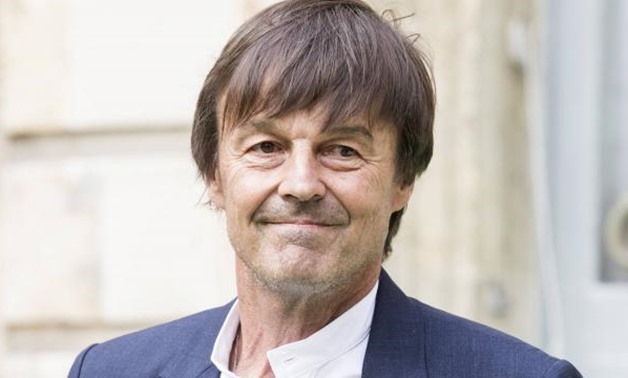
Environment Minister Nicolas Hulot - File photo
PARIS - 7 November 2017: The French government has postponed a long-held target to reduce the share of nuclear energy in the country's power production after grid operator RTE warned it risked supply shortages after 2020 and could miss a goal to curb carbon emissions.
Environment Minister Nicolas Hulot said on Tuesday it was not realistic to cut nuclear energy's share of electricity production to 50 percent by 2025 from 75 percent now and that doing so in a hurry would increase France's CO2 emissions, endanger the security of power supply and put jobs at risk.
"It will be difficult to maintain the target of reducing the share of nuclear to 50 percent by 2025," Hulot told reporters following a cabinet meeting.
He later said in an television interview the government would be working towards a 2030 to 2035 timeframe.
Hulot said that while there was a delay, the government would in a year's time have a clear programme on which reactors to close and when.
In 2015, the previous government of Socialist Francois Hollande passed an energy transition law setting out the 50 percent target by 2025. But Hollande took no concrete steps towards closing any reactors.
Centrist President Emmanuel Macron, elected in May, had promised to keep the target and Hulot, France's best-known environmentalist, said in July it might have to close up to 17 of its 58 reactors by 2025 to achieve it.
RTE said in its 2017-2035 Electricity Outlook that if France went ahead with plans to simultaneously shut down four 40-year-old nuclear reactors and all its coal-fired plants as planned, there could be risks of power supply shortages.
For this winter, RTE said electricity demand was expected to be stable, although unplanned nuclear reactor outages and a prolonged cold spell could squeeze supply.
Concerns that nuclear-reliant France could face tight supplies similar to last year have contributed to wholesale power prices touching new highs in recent weeks, as utility EDF announced delays in the restart of several reactors for safety and regulatory reasons.
The prolonged nuclear outages have forced EDF to cut its nuclear output target twice this year, and it issued a profit warning on Oct. 27.
HULOT
Widely seen as the guardian of the Macron government's green credentials, the popular Hulot - a former television documentary maker turned environmentalist - had in recent months repeatedly said France needed to close several nuclear plants.
But he received little public support from Macron, a strong supporter of nuclear, or Prime Minister Edouard Philippe, a former employee of state-owned reactor builder Areva.
Two weeks before the government was formed in mid-May, a source close to Macron told Reuters he was considering delaying the target for reducing France's reliance on nuclear, although an official spokesman had later denied it.
State-owned EDF, the world's biggest operator of nuclear plants, has long said it made no sense to shut down functioning reactors and instead wants to extend the lifespan of its nuclear fleet from 40 to at least 50 years.
EDF shares closed up 1.3 percent after Hulot's announcement, outperforming the French bourse's 0.5 percent decline.
EDF stock had plunged as much as 7 percent on the day Hulot was appointed environment minister on the expectation he would push for less nuclear and more renewable energy.
Hulot, who made a failed bid to become the green candidate in the 2012 presidential election, had been courted by both Hollande and his conservative predecessor Nicolas Sarkozy to be environment minister.
Hulot told French daily Le Monde last month he had given himself a year to see whether he could reform French energy and agricultural policies.
Greenpeace said Hulot had already shown weakness in fighting fossil fuels and was now jeopardising France's energy transition.
"He should be a bulwark against the oil and nuclear lobbies," the campaign group said in a statement.

Comments
Leave a Comment